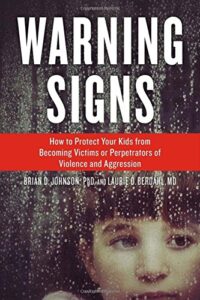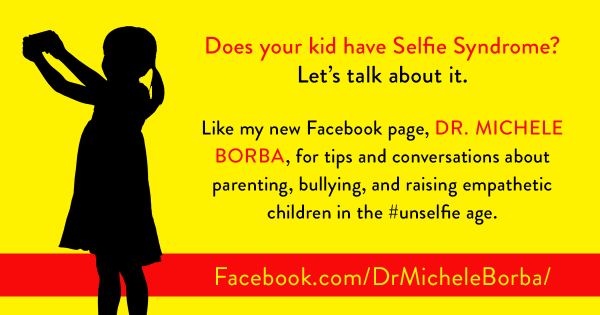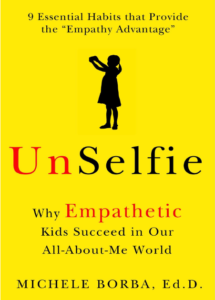Join the #UnSelfie Revolution to Raise Kids with Empathy, Moral Conviction and Courage To Make a Better World
“He never cries at movies or is concerned if his friends are hurt. But he’s a boy, so I’m not worried.”
“Her teachers say my daughter is mean and seems to enjoy it when her classmates cry. I’m sure it’s just a phase she’ll outgrow.”
“He never seems to care about anyone but himself, but it’s probably just his temperament. Besides, I can’t do anything about it.”
Would you worry if those descriptions matched your child? In fact, when should we be concerned when kids engage in callous, uncaring-like behaviors? And even then can we really make a difference on our children’s capacity for empathy?
Those are the questions I’m frequently asked by parents and teachers. Researchers say the answer to whether empathy can be cultivated is an overwhelming “YES.” The problem is too many adults think that bullying, cruelty, insensitivity or unkind actions are “just a phase,” a boy issue or an inborn temperament, and those are huge misconceptions.
Empathy is learned, and the longer we wait to replace our children’s unkind or aggressive actions, the longer that change will take and the greater the risk to their emotional and moral development.
 It’s all why I’m a passionate supporter of a new book entitled, Warning Signs: How to Protect Your Kids from Becoming Victims or Perpetrators of Violence and Aggression. It’s written by Brian D. Johnson, a licensed child psychologist, and Laurie D. Berdahl, an obstetrician-gynecologist with genetic research experience. And they offer sound parenting advice based on the latest research to the issues we worry about most. Just a few questions they provide answers to:
It’s all why I’m a passionate supporter of a new book entitled, Warning Signs: How to Protect Your Kids from Becoming Victims or Perpetrators of Violence and Aggression. It’s written by Brian D. Johnson, a licensed child psychologist, and Laurie D. Berdahl, an obstetrician-gynecologist with genetic research experience. And they offer sound parenting advice based on the latest research to the issues we worry about most. Just a few questions they provide answers to:
What can parents and others concerned adults do to prevent the next Sandy Hook? Are there red flags that warn us if our children might become victims or perpetrators of bullying or of sexual assault? How do we know when a child or young adult is at risk for suicide, or just moody?
These are certainly questions we wonder about, especially at a time when childhood dangers seem increasingly hard to predict or control. My favorite section addresses empathy, subject I’m passionate about, and in particular warning signs of lack of empathy in children.
Here is an excerpt from their chapter, “Perilous Thoughts and Emotions and Their Solutions” that offers those warnings of low empathy. Brian and Laurie gave me permission to include these, but I highly recommend that you read the other chapters (with topics such as “Mental and Emotional Issues Tied to Aggression and Violence,” “Harmful Media Influences and How to Deflect the Damage,” “Bullying and Putting a Stop to It,” Hazardous Friendships,” and more. This book is a treasure-trove for parents and educators.
Empathy Is Self-Protective and Prevents Aggression
Compassion and kindness comprise the essence of humanity. Empathy is the critical emotional ability to put oneself in other people’s shoes to understand their feelings and situations. Children may understand it as having sympathy for people when they experience misfortune. Because low empathy or lack of it is a risk for aggression and violence, instilling empathy in our youth is essential. Perhaps unexpectedly, having empathy also protects them from becoming victims.
Warning Signs of Lack of Empathy
Young children often don’t show empathy, because it develops gradually with increasing age. Here are some warning signs of low empathy in later elementary school-age and older kids:
• Doesn’t show sympathy for people or characters who are suffering (doesn’t care or feel sorry about someone else’s trouble, grief, or misfortune). For example, when someone falls down or gets hurt, the child shows no interest or concern, or laughs as opposed to asking if the person is OK or helping.
• Is usually insensitive to the needs of others (watches someone clearly needing help and does nothing).
• Is inconsiderate or doesn’t thing about other people’s feelings: when someone appears upset, the child ignores it as opposed to asking what is wrong.
• Doesn’t compliment others (sincere compliments show ability to notice what other people do and give them positive feedback).
• Doesn’t listen to others when they’re talking, which indicates a lack of interest in other people’s ideas, situations, or feelings.
Johnson and Berdahl point out: “Parents and other adults can teach empathy to kids just like reading, writing and arithmetic. Be aware that harsh punishments interfere with developing empathy, as does watching trusted adults tolerate bullying. From being sensitively cared for in early childhood to being listened to while venting emotions as emerging adults, kids need our continued warm and kind attentions to develop empathy.”
AMEN!
I highly recommend Warning Signs as a must-read for parents and youth advocates who care about children and want to keep them safe. Written by renowned experts, the tips, signs and research make this a crucial resource for parenting in today’s uncertain era and to help us raise a generation of strong, caring kids.
My latest book, UnSelfie: Why Empathetic Kids Succeed in Our All-About-Me World, has dozens of proven ways to raise good people. I hope you join me in starting an #UnSelfie Revolution to put empath, kindness, and courage back on our child-rearing and educational agendas.
Follow me on twitter: @micheleborba, Facebook: and my blog, Dr. Borba’s Reality Check where I’ll give you proven practices to produce a generation of strong, caring kids.
More Empathy-Building Articles and Ways to Create An #UnSelfieRevolution:
Empathy Is a Verb: My TEDx Talk to Start An UnSelfie Revolution
8 Practices That Raise Caring, Empathetic Kids
6 Simple Ways Children Can Spread Kindness in Schools
3 Horrific Things Violent Social Media Teaches Kids
54 Tips About Empathy to Raise Kids Who Think WE, Not ME (PART II )
95 Ways to Raise Kids To Think WE, Not ME (Part I)
42 Ways to Raise a Kind Child
Why Kids Need More Empathy – My Answer to TIME
5 Ways to Nurture Empathy in A Digital-Driven World
6 Ways to Nurture Kids’ Empathy and Boost Emotional IQ
7 Way to Help Sensitive Kids Keep Empathy Open



